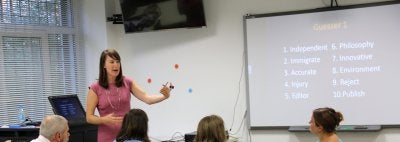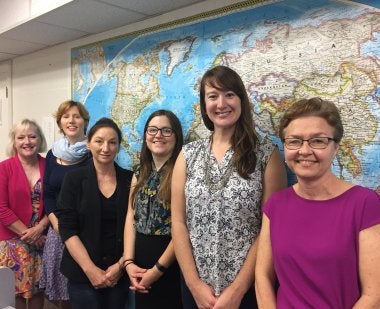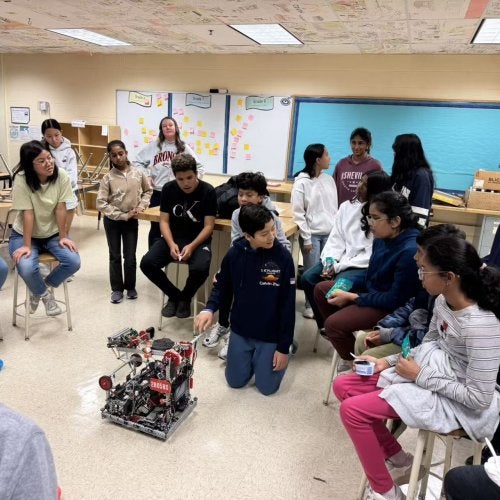

Through U.S. State Department Fellowships, Maryland English Institute Faculty Teach English Globally

On September 11, Dr. Elizabeth Driver, Director of Maryland English Institute, flies to Russia to teach English at Kazan Federal University, the same institute Tolstoy and Lenin attended. She was selected as an English Language Fellow by the U.S. State Department for 2018-19, and is the sixth MEI member to serve globally as part of the prestigious year-long fellowship program.
English Language Fellows support teaching and learning English around the world, including providing English classes to non-native speakers in universities, as well as professional development for English teachers. Through the program, TESOL scholars share their expertise to improve the quality of English language instruction at academic institutions worldwide. Fellowships vary based on the country, with some receiving unusual placements, Driver says, such as teaching English to Tanzanian wildlife managers at the base of Mt. Kilimanjaro and supporting Hungarian military officers who are learning English.
In Kazan, Driver will be teaching English to undergraduate and master’s students and holding a series of professional development workshops for English teachers in the broader region.
“Being flexible is one of the main criteria in teaching abroad,” Driver says, who served as a visiting professor at the University of Szeged in Hungary from 2003-06.
In Hungary, Driver adapted to different academic norms, noting that a student she had never seen before showed up to take a final exam in her class, as attendance is not mandatory. Another student, when asked to provide feedback on her teaching, said that she was too kind to students who provided incorrect answers.
Melanie Baker Robbins, a lecturer at MEI and a doctoral student in international education policy, echoed the need for adaptability in teaching outside of the U.S. higher education system. She served as an English Language Fellow in Gori, Georgia, in 2015-16.
Robbins spent the summer prior to going to Georgia learning the language’s distinctive alphabet and a small amount of vocabulary. When she told a previous Georgian fellow that she learned the word ‘plan,’ the fellow laughed and said that would be the last time she would use it.
During her teaching assignment at Gori State Teaching University, there was no online academic calendar, as is common in the U.S.
“I didn’t know when the semester ended. I was told on Monday that the class that I had taught on the previous Friday was the last class,” Robbins said.
Gori, located outside the capital and the birthplace of Stalin, was in the process of transitioning from Soviet-style to post-Soviet style education during Robbins' fellowship. That transition in education style aligned with the English Language Fellow Program’s promotion of active learning and being able to communicate, as opposed to listening and reading content with an emphasis on being correct. Fellows like Robbins helped English teachers, many of whom had been trained in the Soviet style, to adapt their teaching of English to a more interactive pedagogy.
In addition to increasing their flexibility, both Robbins and Driver say that living abroad and operating in a foreign language increased their empathy for students at MEI, which provides English language instruction to international students at the university.
“It helps you develop a lot of empathy for students who come to the U.S.,” Driver said, who spoke no Hungarian when she arrived in Hungary. As a mother of two school-age children at the time who picked up Hungarian more quickly than the adults did, she also developed insight into the plight of immigrant families, as she frequently had to rely on her children to navigate daily tasks normally done by adults, like making doctor appointments or doing banking.
Robbins’ experience in Georgia also increased her empathy for those learning English. While she typically learns languages easily, the Georgian language challenged Baker, as it is a non-IndoEuropean language in its own linguistic category and one of the ten oldest languages still spoken in the world. It is distinct – for instance, ‘mama’ means father and ‘deda’ means mother in Georgian, upending expectations.
As director of MEI, which is housed in the UMD College of Education, Driver has seen how the fellowship program has augmented the teaching of several of the MEI faculty members who previously completed English Language Fellow assignments.
“They were already strong teachers when they went abroad, but when they returned to MEI, their experiences led to new teaching approaches and ideas,” Driver said. “The fellowship program is a chance for experienced TESOL teachers to help develop language programs abroad, but they learn new things, too. It’s a two-way street.”
The State Department-funded fellowship program, which is celebrating its 50th anniversary in 2018, also plays an important role in international diplomacy efforts by facilitating citizen diplomacy.
“I'm a huge believer in the potential education holds for fostering greater cross-cultural understanding, and this program was an excellent chance to use my expertise in English language teaching for that purpose,” Robbins said, who hopes to return to Georgia to complete her dissertation.
[Top image: Melanie Baker Robbins leads a professional development workship in Ukraine.]


